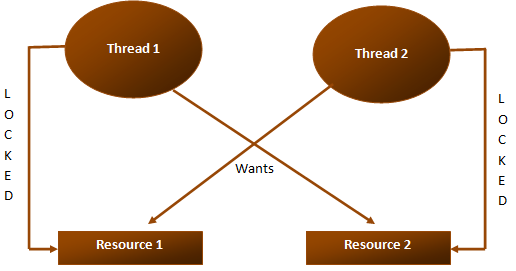We will discuss, acquiring locks in a specific defined order to resolve a deadlock. We will be working with the same example that we worked with in Part 95.
Sample program code used in the demo.
Sample program code used in the demo.
using System;
using System.Threading;
public class Program
{
public static void Main()
{
Console.WriteLine("Main Started");
Account accountA = new Account(101, 5000);
Account accountB = new Account(102, 3000);
AccountManager accountManagerA =
new AccountManager(accountA, accountB, 1000);
Thread T1 = new Thread(accountManagerA.Transfer);
T1.Name = "T1";
AccountManager accountManagerB =
new AccountManager(accountB, accountA, 2000);
Thread T2 = new Thread(accountManagerB.Transfer);
T2.Name = "T2";
T1.Start();
T2.Start();
T1.Join();
T2.Join();
Console.WriteLine("Main Completed");
}
}
public class Account
{
double _balance;
int _id;
public Account(int id, double balance)
{
this._id = id;
this._balance = balance;
}
public int ID
{
get
{
return _id;
}
}
public void Withdraw(double amount)
{
_balance -= amount;
}
public void Deposit(double amount)
{
_balance += amount;
}
}
public class AccountManager
{
Account _fromAccount;
Account _toAccount;
double _amountToTransfer;
public AccountManager(Account fromAccount, Account toAccount, doubleamountToTransfer)
{
this._fromAccount = fromAccount;
this._toAccount = toAccount;
this._amountToTransfer = amountToTransfer;
}
public void Transfer()
{
object _lock1, _lock2;
if (_fromAccount.ID < _toAccount.ID)
{
_lock1 = _fromAccount;
_lock2 = _toAccount;
}
else
{
_lock1 = _toAccount;
_lock2 = _fromAccount;
}
Console.WriteLine(Thread.CurrentThread.Name
+ " trying to acquire lock on "
+ ((Account)_lock1).ID.ToString());
lock (_lock1)
{
Console.WriteLine(Thread.CurrentThread.Name
+ " acquired lock on "
+ ((Account)_lock1).ID.ToString());
Console.WriteLine(Thread.CurrentThread.Name
+ " suspended for 1 second");
Thread.Sleep(1000);
Console.WriteLine(Thread.CurrentThread.Name
+ " back in action and trying to acquire lock on "
+ ((Account)_lock2).ID.ToString());
lock (_lock2)
{
Console.WriteLine(Thread.CurrentThread.Name
+ " acquired lock on "
+ ((Account)_lock2).ID.ToString());
_fromAccount.Withdraw(_amountToTransfer);
_toAccount.Deposit(_amountToTransfer);
Console.WriteLine(Thread.CurrentThread.Name + " Transfered "
+ _amountToTransfer.ToString() + " from "
+ _fromAccount.ID.ToString() + " to "
+ _toAccount.ID.ToString());
}
}
}
}
